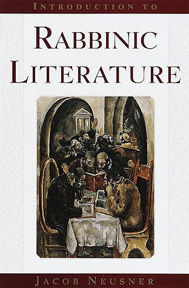Multimedia • Reference • Religion • Travel |
 Introduction to Rabbinic Literature Jacob Neusner
Description From The Publisher: With the publication of this volume, the Anchor Bible Reference Library achieves a landmark in the history of rabbinic literature and religion. In Introduction to Rabbinic Literature, legendary author Jacob Neusner collects the essence of a lifetime of scholarship. In short, this book explores the formative age of rabbinic literature, and tells in a simple, straightforward way what these documents are, where to find them, how to read them, and why their contents matter - and it does this all within the confines of one volume. With the hands of a master scholar, Neusner weaves together the rich tapestry of documents that make up the literature of the rabbis, and shows why they are often called "The Other Half of the Torah" - the oral Torah, for they contain the commentary of the great rabbis on ancient scripture. It's all discussed here - the Mishnah, the Tosefta, the Talmuds of the Land of Israel and of Babylonia, the Midrash compilations, and much more. In addition, Neusner pays special attention to the literature of the rabbis as it pertains to the Old Testament and Christianity. In reading this text, it is clear how and why the writings of the great rabbis have taken their place at the summit of humanity's intellectual achievement and heritage. And in the writing of this text, Jacob Neusner has created the definitive and indispensable guide for all those interested in the intriguing world of the rabbis during the centuries immediately following the emergence of Christianity. Reader's Index Send us your favorite quotes or passages from this book. About the Author Jacob Neusner is Research Professor of Religion and Theology Bard College Annandale-on-Hudson, NY Table of Contents Preface Introduction Pt. 1 Rabbinic Literature as a Whole I Defining Rabbinic Literature and Its Principal Parts II Distinguishing Documents by Distinctive Characteristics: Rhetoric and Topic III Documentary Coherence and Differentiation: The Four Logics of Coherent Discourse in Rabbinic Literature IV The Dialectical Argument in Rabbinic Literature Pt. 2 The Mishnah and Its Exegesis V The Mishnah VI The Tosefta VII The Talmud of the Land of Israel VIII The Talmud of Babylonia Pt. 3 The Reception of Scripture: The Three Types of Midrash-Exegesis in Rabbinic Literature IX Midrash: Writing with Scripture X Mekhilta Attributed to R. Ishmael (Exodus) XI Sifra (Leviticus) XII Sifre to Numbers XIII Sifre to Deuteronomy XIV Genesis Rabbah XV Leviticus Rabbah XVI Pesiqta de Rab Kahana XVII Pesiqta Rabbati XVIII Song of Songs Rabbah XIX Ruth Rabbah XX Lamentations Rabbati XXI Esther Rabbah Part One Pt. 4 Writing without Authors: The Sage in Rabbinic Literature XXII Rabbinic Literature and Individual Sages: Writing without Authors XXIII Tractate Abot (The Fathers) XXIV Abot de Rabbi Nathan (The Fathers According to Rabbi Nathan) Pt. 5 The Targumim XXV The Targumim in the Context of Rabbinic Literature Pt. 6 Conclusion XXVI Rabbinic Literature and the Formation of Judaism Appendix: Two Open Questions in the Study of Rabbinic Literature General Index Index to Texts Customer Reviews Write your own online review. Look for Similar Books by Subject
| |||||||
Copyright ©1996-2011 CenturyOne Bookstore. All Rights Reserved. All prices subject to change and given in U.S. dollars. Your purchase from CenturyOne.com will assist the CenturyOne Foundation in providing funding for various archaeological and research projects which seek to provide more information about the period of the First Century C.E., the origins of Christianity and the world of the Bible in general. All materials contained in http://www.centuryone.com are protected by copyright and trademark laws and may not be used for any purpose whatsoever other than private, non-commercial viewing purposes. Derivative works and other unauthorized copying or use of stills, video footage, text or graphics is expressly prohibited. |

